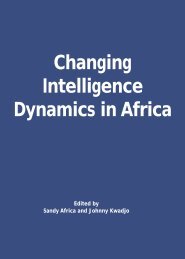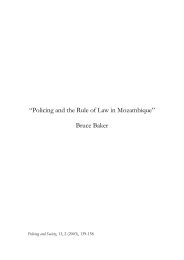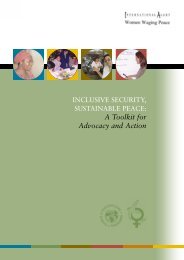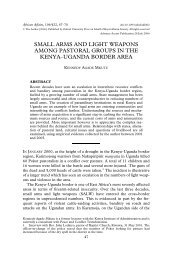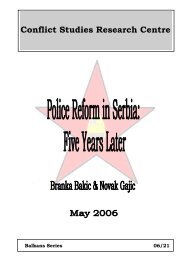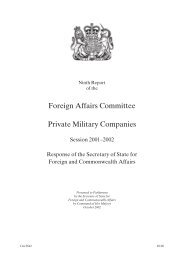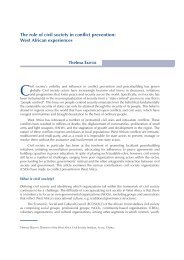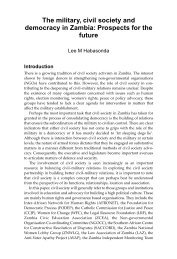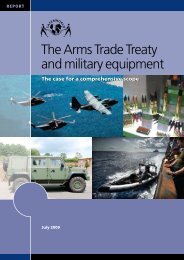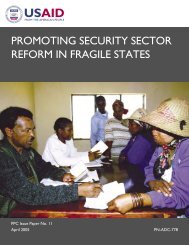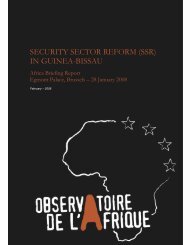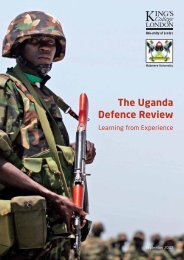AFGHANISTAN'S ELECTION CHALLENGES
AFGHANISTAN'S ELECTION CHALLENGES
AFGHANISTAN'S ELECTION CHALLENGES
Create successful ePaper yourself
Turn your PDF publications into a flip-book with our unique Google optimized e-Paper software.
Afghanistan’s Election Challenges<br />
Crisis Group Asia Report N°171, 24 June 2009 Page 25<br />
1. 30Impartial institutions<br />
The IEC sets the tone and must act impartially – and<br />
be seen to act impartially – with the IEC chairman,<br />
and other staff, making no public statements other<br />
than on technical issues. Before the 2010 poll, the<br />
next president should ensure that the Wolesi Jirga can<br />
approve election commissioners. The two most widespread<br />
kinds of fraud in 2005 were ballot stuffing and<br />
fraud during the counting process, both requiring<br />
complicity from electoral staff. The IEC must demonstrate<br />
that it is ready to take action against staff where<br />
there are problems. So far, little result has been seen<br />
after allegations of conflicts of interest or allegations<br />
of partiality. 191 If the IEC fails to act, there must be a<br />
clear and well-publicised right of appeal to the ECC.<br />
Training on election day procedures must also be rigorous<br />
to prevent the confusion that occurred previ-<br />
ously over the application of ink to voters’ fingers.<br />
Staff also need to be familiarised with the new, more<br />
complex counting procedures.<br />
Vote counting at large centres in the provincial capitals<br />
proved problematic in 2005, with weeks of delays and<br />
clear cases of fraud. The National Assembly has sought<br />
to transfer counting to district level in the current draft<br />
of the electoral law. In its own regulation, the IEC has<br />
however decided to conduct the count at the polling<br />
centres, 192 which would appear most appropriate. The<br />
potential for “booth capturing” – all the centre's staff<br />
either intimidated or conspiring to stuff ballots and<br />
falsify the count – and intimidation are outweighed by<br />
the speed and transparency of results, as well as being<br />
a check against wide-scale fraud by one group or candidate.<br />
There should be extensive checks on every part<br />
of this process, from the count itself, to the transportation<br />
of ballots, to the tabulation of results. Results must<br />
be clearly posted at the polling centres and provided<br />
to candidate agents before transport. Observers also<br />
need to be allowed to travel with ballots to help guard<br />
against any changes between the polling centres and<br />
the IEC provincial and central facilities.<br />
2. 31Complaints<br />
3. 32Observation and monitoring<br />
In 2005, the ECC handled more than 5,423 complaints<br />
with 37 resulting in candidate disqualification. 193 The<br />
vast majority did not relate to electoral offences or were<br />
inadequately documented, and thus dismissed. This<br />
time there is a need for large-scale public outreach to<br />
explain the limitations of the complaints system, combined<br />
with training for legal unions, human rights and<br />
other civil society organisations, political parties and<br />
candidates to ensure that complaints filed are approneed<br />
for wide buy-in on the future scope and shape of<br />
priate and well-documented. Going forward, there is a<br />
the electoral complaints process, and adequate prepara-<br />
tions and funds allocated for the 2010 elections.<br />
In 2005, 240,000 observers, political party and candidate<br />
agents and media representatives were accredited.<br />
194 Even at that time the movement of international<br />
observers – the largest number from the European Union<br />
– was severely restricted by security concerns.<br />
Given the rising security threat, delegations are likely<br />
to be smaller and even more limited in areas to which<br />
they can travel during this round of elections. Despite<br />
these limitations, they can still be useful in observing<br />
the tabulation and auditing processes to better secure<br />
the count at levels where there can be wide-scale<br />
fraud.<br />
The vast majority of those accredited last time were<br />
candidate and political party agents, 195 and this is<br />
likely to be the case again. These agents played a<br />
valuable oversight role in 2005 but, given some complaints<br />
of intimidation, at times a result of a misunderstanding<br />
of the procedures, efforts to ensure agents’<br />
understanding of the process are a priority. Candidates<br />
must also be warned that they will be held accountable<br />
for their agents’ behaviour. Training on election<br />
processes – particularly on the correct voting and<br />
counting procedures – is supposed to be part of the<br />
191 FEFA, for instance, alleged that that the head of a voter<br />
registration centre in Maimana was the chairperson of the<br />
women’s affairs section of a political party and that a senior<br />
election official in Paktia was the brother of a party representative<br />
(Second Phase report, pp. 2-3). In Nangarhar, it alleged<br />
that a parliamentarian influenced the hiring and firing of election<br />
officials. Third Phase report, op. cit., p. 3.<br />
192 “Regulation on Counting”, Independent Election Commission,<br />
undated 2009.<br />
193 Of these 23 were for links to illegal armed groups, eleven<br />
for holding government office and three for violation of electoral<br />
law or codes of conduct. Final report, Electoral Complaints<br />
Commission, March 2006, p. 20.<br />
194 In 2005 the JEMB registered around 10,600 domestic<br />
observers, 780 international observers, 32,000 political party<br />
agents, 198,000 candidate agents, 1,300 media. External<br />
relations section, Independent Election Commission website,<br />
www.iec.org.af.<br />
195 “Agent: a person appointed to represent a political party<br />
or candidate at an election”, Article 1, “Regulation on accreditation<br />
of observers, reporters and agents of political parties<br />
and independent candidates”, Independent Election Commission,<br />
undated.



